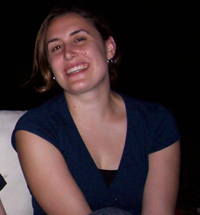Sarah Feldt: Difference between revisions
From Santa Fe Institute Events Wiki
Sarahfeldt (talk | contribs) No edit summary |
Sarahfeldt (talk | contribs) No edit summary |
||
| (2 intermediate revisions by the same user not shown) | |||
| Line 1: | Line 1: | ||
[[Image:Sarahpic2009.jpg]] | |||
I recently finished my Ph.D. in physics at the University of Michigan and am about to head off to a postdoc at UC Irvine. The title of my dissertation was "Understanding the interplay of structure and dynamics in neuronal networks", and much of my research has focused on questions in the field of neuroscience. Networks are very important in this field as the brain is a prime example of a very complicated network. Important features of neuronal networks are that the nodes (neurons) are dynamic due to the firing of action potentials, and the edges (synapses) are constantly evolving. The main part of my dissertation focused on a new clustering algorithm that utilizes these neuronal dynamics to detect groupings of neurons with similar firing patterns. I think that studying networks with dynamic nodes will become increasingly important as we try to apply network theory to more types of networks. Since neuronal networks can be viewed as time series of discrete events, I'd like to extend this line of thinking to types of networks outside of neuroscience, and I'm hoping that this workshop will be a good place to do so. | |||
In addition to the algorithm development and subsequent data analysis, much of my time in graduate school was spent doing experimental work growing dissociated hippocampal cultures and studying how the underlying structure of these networks influences their dynamics. I also spent some time doing computational modeling of epilepsy where I studied two coupled networks of neurons and looked at resonance and driving relationships between the networks as one network transitioned into seizure dynamics. Although this was my first project as a graduate student, my new postdoctoral position will also be in the field of epilepsy research. Network analysis is becoming increasingly important in epilepsy to study the initiation and propagation of seizures, so I'm quite excited to work in this area. | |||
Latest revision as of 05:05, 10 July 2009
I recently finished my Ph.D. in physics at the University of Michigan and am about to head off to a postdoc at UC Irvine. The title of my dissertation was "Understanding the interplay of structure and dynamics in neuronal networks", and much of my research has focused on questions in the field of neuroscience. Networks are very important in this field as the brain is a prime example of a very complicated network. Important features of neuronal networks are that the nodes (neurons) are dynamic due to the firing of action potentials, and the edges (synapses) are constantly evolving. The main part of my dissertation focused on a new clustering algorithm that utilizes these neuronal dynamics to detect groupings of neurons with similar firing patterns. I think that studying networks with dynamic nodes will become increasingly important as we try to apply network theory to more types of networks. Since neuronal networks can be viewed as time series of discrete events, I'd like to extend this line of thinking to types of networks outside of neuroscience, and I'm hoping that this workshop will be a good place to do so.
In addition to the algorithm development and subsequent data analysis, much of my time in graduate school was spent doing experimental work growing dissociated hippocampal cultures and studying how the underlying structure of these networks influences their dynamics. I also spent some time doing computational modeling of epilepsy where I studied two coupled networks of neurons and looked at resonance and driving relationships between the networks as one network transitioned into seizure dynamics. Although this was my first project as a graduate student, my new postdoctoral position will also be in the field of epilepsy research. Network analysis is becoming increasingly important in epilepsy to study the initiation and propagation of seizures, so I'm quite excited to work in this area.

